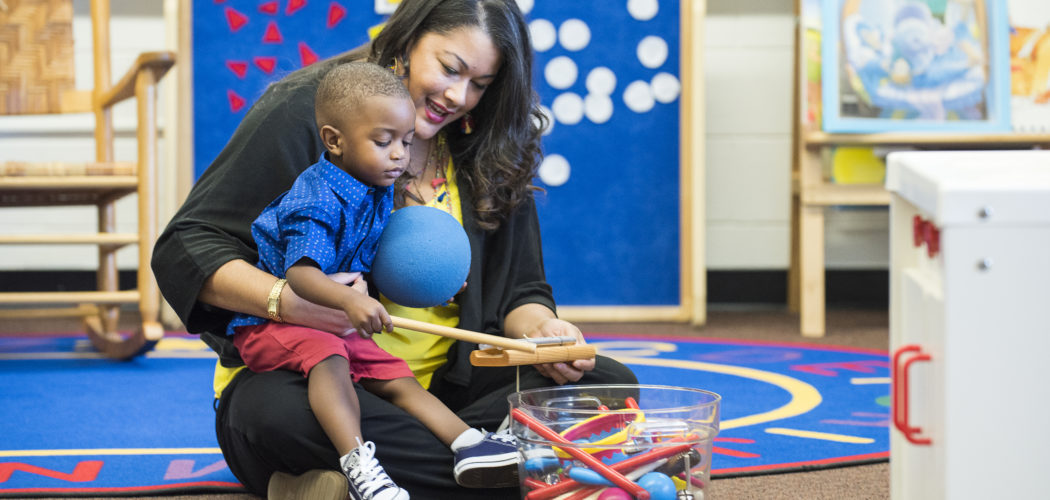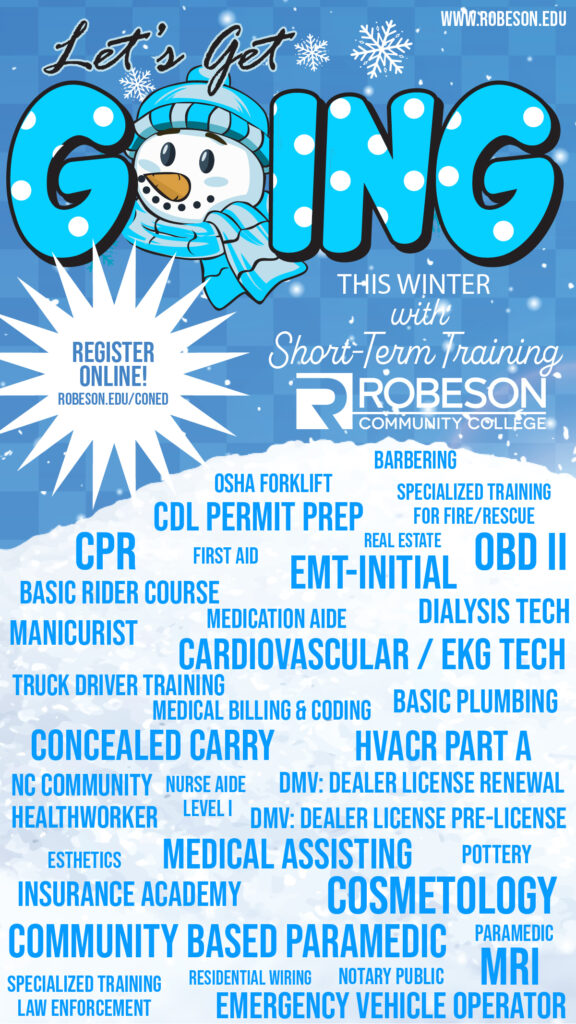
Education
Career Description
The Early Childhood Education Associate curriculum prepares individuals to work with children from infancy through middle childhood in diverse learning environments. Students will combine learned theories with practice in actual settings with young children under the supervision of qualified teachers.
- OVERVIEW
- PROGRAMS OF STUDY
- CONTACTS
- Elementary Education Residency Licensure Certificate
- CAREER OPTIONS
-
Graduates are prepared to plan and implement developmentally appropriate programs in early childhood settings. Employment opportunities include child development and child care programs, preschools, public and private schools, recreational centers, Head Start Programs and school age programs.
The following is a list of local employers in the field of Early Childhood:
- Public Schools of Robeson County
- Public Schools of North Carolina
- Lumbee Regional Development Association
- Southeastern Community & Family Services, Inc.
Entry-Level Salary/Hourly Wage
- Annual Salary – $18,540 yr. (NCWorks Online)
- Hourly Wage – $8.91 (NCWorks Online)
- ESSENTIAL SKILLS
-
- Highly motivated to work with young children
- Strong sense of ethical behavior
- Ability to work well with others
- Effective oral, written and communication skills
- Teacher Preparation
-
The Associate in Arts in Teacher Preparation degree shall be granted for a planned program of study consisting of a minimum of 60 semester hours of credit (SHC) of college transfer courses. Within the degree program, the institution shall include opportunities for the achievement of competence in reading, writing, oral communication, fundamental mathematical skills, and basic computer use.
- Residency Licensure Certificate
-
With man school systems across the State of North Carolina struggling to fill open positions, Robeson Community College is proactively seeking solutions to help curb the shortage. This fall, RCC will offer the Residency Licensure Certificate program, as more and more individuals who want to teach are trying to find alternative ways to obtain licensure.
To obtain the new credentials, students must complete six courses:
EDU 270 – Effective Instructional Environments
EDU 272 – Technology, Data, and Assessment
EDU 277 – Integrated Curriculum and Instructional Strategies: Math / Science
EDU 278 – Integrated Curriculum and Instructional Strategies: Social Studies / ELA
EDU 279 – Literacy Development and Instruction
EDU 283 – Educator Preparation PracticumEarning the certificate is only part of becoming fully licensed. You will still need to meet additional specific requirements set by the NCDPI.
- Early Childhood Education-Career Track, AAS
-
The Early Childhood Education curriculum prepares individuals to work with children from birth through eight in diverse learning environments. Students will combine learned theories with practice in actual settings with young children under the supervision of qualified teachers.
Course work includes child growth and development; physical/nutritional needs of children; care and guidance of children; and communication skills with families and children. Students will foster the cognitive/language, physical/motor, social/emotional and creative development of young children.
Graduates are prepared to plan and implement developmentally appropriate programs in early childhood settings. Employment opportunities include child development and child care programs, preschools, public and private schools, recreational centers, Head Start Programs, and school age programs.
The Early Childhood Education-Career Track, AAS is a 71 credit hour program.
For more information on Loading…
- Early Childhood Education-Transfer Licensure Track, AAS
-
This track is designed for those individuals who are interested in transferring to a four-year institution and obtaining a teaching license.
Early Childhood Education-Transfer Licensure Track, AAS is a 74 credit hour program.
For more information on Loading…
- Early Childhood Education-Transfer Non-Licensure Track, AAS
-
This track is designed for those individuals who are interested in transferring to a four-year institution but do not plan on obtaining a teaching license.
Early Childhood Education-Transfer Non-Licensure Track, AAS is a 74 credit hour program.
For more information on Loading…
- Early Childhood Administration Certificate
-
The Early Childhood Administration Certificate prepares individuals pursuing administrating roles in diverse child care settings to effectively work with children, families and teachers. The certificate is composed of learning opportunities in developmental theories, competency and evidence-based professional knowledge, administrative skills and leadership qualities.
Course work includes foundations in early childhood education, physical/nutritional needs of young children, safety issues in the care of young children; communication and leadership skills with teachers, families and children; programming and staffing, budgeting/financial management and marketing, and rules and regulations of early childhood programs.
Employment opportunities include entrepreneurship and/or management of child development and child care programs, preschools, public and private schools, recreational centers, Early Head Start and Head Start programs, and other programs.
Early Childhood Administration Certificate is a 16 credit hour program.
For more information on Loading…
- Early Childhood Associate Certificate
-
The Early Childhood Associate Certificate is designed to prepare individuals to work with children from birth through eight in diverse learning environments.
Early Childhood Associate Certificate is a 16 credit hour program.
For more information on Loading…
- Early Childhood Preschool Certificate
-
The Early Childhood Preschool Certificate prepares individuals to work with preschool aged children (3-5) in diverse learning environments. Students will combine learned theories, competency-based knowledge, and practice in actual settings with preschool children.
Course work includes child growth and development, physical/nutritional needs of preschool children, safety issues in the care of preschool children; care and guidance; communication skills with families and children; design and implementation of appropriate curriculum; and other related topics.
Successful completers should be prepared to plan and implement developmentally appropriate preschool programs in early childhood settings. Employment opportunities include child development and child care programs, preschools, public and private schools, recreational centers, Head Start Programs, and other preschool programs.
Early Childhood Preschool Certificate is a 16 credit hour program.
For more information on Loading…
- Early Childhood Associate CTE Certificate
-
The Early Childhood Associate Pathway is designed for accelerated high school juniors and seniors who are ready to get a head start on career and technical courses that will lead to a job credential, certificate or diploma in a technical career.
The Early Childhood Associate Pathway is designed to prepare individuals to work with children from birth through eight in diverse learning environments.
Early Childhood Associate CTE Certificate is a 16 credit hour program.
For more information on the program: Loading…
- Elementary Education Residency Licensure Certificate
-
The Elementary Education Residency Certificate curriculum provides a course of study leading to the development of the general pedagogical competencies needed to become certified to teach by the North Carolina Department of Public Instruction.
Course work includes learning theory, instructional/educational technology, diverse learners, school policies and procedures, expectations and responsibilities of educators, teaching strategies/methods for specific content/specialty areas, formative/summative assessments, data informed practice, and classroom organization/management to enhance learning.
Graduates should meet general pedagogical competencies and demonstrate effective teaching practices. Additional requirements, such as pre-service training, passing the state required assessments, and the criteria included in the North Carolina Teacher Evaluation System, are required for licensure.
For more information on the program: Elementary Education Residency Licensure (C55490) Certificate
- Infant/Toddler Care Certificate
-
The Infant/Toddler Care Certificate prepares individuals to work with children from infancy to three years of age in diverse learning environments. Students will combine learned theories, competency-based knowledge, and practice in actual settings with infants and toddlers.
Course work includes infant/toddler growth and development: physical/nutritional needs of infants and toddlers; safety issues in the care of infants and toddlers; care and guidance; communication skills with families and children; design an implementation of appropriate curriculum; and other related topics.
Successful completers should be prepared to plan and implement developmentally appropriate infant/toddler programs in early childhood settings. Employment opportunities include child development and child care programs, preschools, public and private schools, recreational centers, Early Head Start Programs, and other infant/toddler programs.
Infant/Toddler Care Certificate is a 16 credit hour program.
For more information on the program: Loading…
CHAVIS-HARRIS, PHOEBE, Ed.D.
Program Director
Email: pharris@robeson.edu
Phone: (910) 272-3448
Office: 804E
LOCKLEAR, KIMBERLY, MAEd.
Education Faculty
Email: kilocklear@robeson.edu
Phone: (910) 272-3440
Office: 804A
The Elementary Education Residency Certificate curriculum provides a course of study leading to the development of the general pedagogical competencies needed to become certified to teach by the North Carolina Department of Public Instruction.
Course work includes learning theory, instructional/educational technology, diverse learners, school policies and procedures, expectations and responsibilities of educators, teaching strategies/methods for specific content/specialty areas, formative/summative assessment, data informed practice, and classroom organization/management to enhance learning.
Graduates should meet general pedagogical competencies and demonstrate effective teaching practices. Additional requirements, such as pre-service training, passing the state required assessments, and the criteria included in the North Carolina Teacher Evaluation System, are required for licensure.
- Eligibility
-
To be eligible for this program, individuals must meet the following requirements:
● Employed or under contract for employment with a school
● Bachelor’s degree (degree must meet the 24 hrs of gen ed required by NCDPI)
● 2.7 GPA
- Completion Timeline
-
Overall, the program is designed to be completed in two to three years. Teachers seeking licensure can complete Robeson Community College’s residency program and be recommended for licensure in less than three years.
To complete the program and be recommended for licensure, students must complete the following in their three years of residency licensure:
● Six courses (18 credit hours) with a grade of “C” or better.
● Required Testing with minimum passing scores (Praxis Math: 150 & Pearson Reading: 229)
● edTPA (passing scores all three components, edTPA PA 13: 34, edTPA PA 15: 40, edTPA 18: 48)
- How to Apply
-
**Applications are completed through CFNC, not on the RCC website.
Applicant Steps:
- Create a CFNC account to access the application link (required by the system)
- Click “Apply to College”
- Click “Application Hub” CFNC.org – Application Hub
- Click “Start an Application”
(Note: The application will prompt you for a Residency Certification #; just click on the link provided in the application. Use the same login and password for your CFNC account. This process is to verify your NC residency status so that you receive in-state tuition and only takes a few minutes. Have your driver’s license # and your social security # ready.) - Select “Alternative NC Teaching Licensure: NCCCS Cultivating Carolina Classrooms.”
- At the start of the application, you must complete the “Residency Determination” form using your social security card and driver’s license
- In addition to the application, students must provide: • unofficial transcripts for admissions purposes • official transcripts once admitted to the program • a letter of employment or promised placement from the PSU/LEA
- When you arrive at the field for “Educator Prep Program,” you will be asked to select your top three community college options. Please select “Robeson Community College” as your first option.
- Submit your application
- Once the application is submitted, the applicant will be contacted by the NCCCS EPP Program Coordinator to determine eligibility and college placement of the applicant along with information about next steps.
- Contact
-
For additional information please contact the following individuals:
CHAVIS-HARRIS, PHOEBE, ED.D.
Program Director
Email: pharris@robeson.edu
Phone: (910) 272-3448OXENDINE, MELISSA, ED.D.
Education Faculty (Adjunct)
Email: moxendine@robeson.edu
Phone: (910) 272-3441












